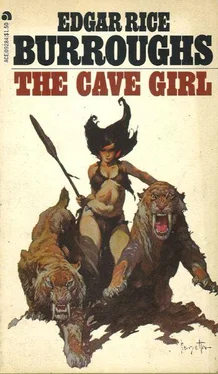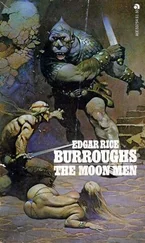Edgar Burroughs - The Cave Girl
Здесь есть возможность читать онлайн «Edgar Burroughs - The Cave Girl» весь текст электронной книги совершенно бесплатно (целиком полную версию без сокращений). В некоторых случаях можно слушать аудио, скачать через торрент в формате fb2 и присутствует краткое содержание. Жанр: Боевая фантастика, на английском языке. Описание произведения, (предисловие) а так же отзывы посетителей доступны на портале библиотеки ЛибКат.
- Название:The Cave Girl
- Автор:
- Жанр:
- Год:неизвестен
- ISBN:нет данных
- Рейтинг книги:5 / 5. Голосов: 1
-
Избранное:Добавить в избранное
- Отзывы:
-
Ваша оценка:
- 100
- 1
- 2
- 3
- 4
- 5
The Cave Girl: краткое содержание, описание и аннотация
Предлагаем к чтению аннотацию, описание, краткое содержание или предисловие (зависит от того, что написал сам автор книги «The Cave Girl»). Если вы не нашли необходимую информацию о книге — напишите в комментариях, мы постараемся отыскать её.
The Cave Girl — читать онлайн бесплатно полную книгу (весь текст) целиком
Ниже представлен текст книги, разбитый по страницам. Система сохранения места последней прочитанной страницы, позволяет с удобством читать онлайн бесплатно книгу «The Cave Girl», без необходимости каждый раз заново искать на чём Вы остановились. Поставьте закладку, и сможете в любой момент перейти на страницу, на которой закончили чтение.
Интервал:
Закладка:
“Five times I came down to look at you. You never saw me until the last time, then you set out after me, roaring in a horrible voice.
“I was very much afraid, for I knew that you must be very brave to live all alone by the edge of the forest without any shelter, or even a stone to hurl at Nagoola, should he come out of the woods to devour you.”
Waldo Emerson shuddered. “Who is Nagoola?” he asked.
“You do not know Nagoola!” the girl exclaimed in surprise.
“Not by that name,” replied Waldo.
“He is as large,” she began in description, “as two men, and black, with glossy coat. He has two yellow eyes, which see as well by night as by day. His great paws are armed with mighty claws. He—”
A rustling from the bushes which fringed the opposite cliff-top caused her to turn, instantly alert.
“Ah,” she whispered, “there is Nagoola now.”
Waldo looked in the direction of her gaze.
It was well that the girl did not see his pallid face and popping eyes as he looked into the evil mask of the great black panther that crouched watching them from the river’s further bank.
Into Waldo’s breast came great panic. It was only because his fear-prostrated muscles refused to respond to his will that he did not scurry, screaming, from the sight of that ferocious countenance.
Then, through the fog of his cowardly terror, he heard again the girl’s sweet voice: “I knew that you must be very brave to live all alone by the edge of that wicked forest.”
For the first time in his life a wave of shame swept over Waldo Emerson.
The girl called in a taunting voice to the panther, and then turned, smiling, toward Waldo.
“How brave I am now,” she laughed. “I am no longer afraid of Nagoola. You are with me.”
“No,” said Waldo Emerson, in a very weak voice, “you need not fear while I am with you.”
“Oh!” she cried. “Slay him. How proud I should be to return to my people with one who vanquished Nagoola, and wore his hide about his loins as proof of his prowess.”
“Y-yes,” acquiesced Waldo faintly.
“But,” continued the girl, “you have slain many of Nagoola’s brothers and sisters. It is no longer sport to kill one of his kind.”
“Yes—yes,” cried Waldo. “Yes, that is it—panthers bore me now.”
“Oh!” The girl clasped her hands in ecstasy. “How many have you slain?”
“Er—why, let me see,” the young man blundered. “As a matter of fact, I never kept any record of the panthers I killed.”
Waldo was becoming frantic. He had never lied before in all his life. He hated a lie and loathed a liar. He wondered why he had lied now.
Surely it were nothing to boast of to have butchered one of God’s creatures—and as for claiming to have killed so many that he could not recall the number, it was little short of horrible. Yet he became conscious of a poignant regret that he had not killed a thousand panthers, and preserved all the pelts as evidence of his valor.
The panther still regarded them from the safety of the farther shore. The girl drew quite close to Waldo in the instinctive plea for protection that belongs to her sex. She laid a timid hand upon his skinny arm and raised her great, trusting eyes to his face in reverent adoration.
“How do you kill them?” she whispered. “Tell me.”
Then it was that Waldo determined to make a clean breast of it, and admit that he never before had seen a live panther. But as he opened his mouth to make the humiliating confession he realized, quite suddenly, why it was that he had lied—he wished to appear well in the eyes of this savage, half-clothed girl. He, Waldo Emerson Smith-Jones, craved the applause of a barbarian, and to win it had simulated that physical prowess which generations of Smith-Joneses had viewed from afar—disgusted, disapproving.
The girl repeated her question.
“Oh,” said Waldo, “it is really quite simple. After I catch them I beat them severely with a stick.”
The girl sighed.
“How wonderful!” she said.
Waldo became the victim of a number of unpleasant emotions—mortification for this suddenly developed moral turpitude; apprehension for the future, when the girl might discover him in his true colors; fear, consuming, terrible fear, that she might insist upon his going forth at once to slay Nagoola. But she did nothing of the kind, and presently the panther tired of watching them and turned back into the tangle of bushes behind him.
It was with a sigh of relief that Waldo saw him depart.
4
Death’s Doorway
Late in the afternoon the girl suggested that they start that night upon the journey toward her village.
“The bad men will not be abroad after dark,” she said. “With you at my side, I shall not fear Nagoola.”
“How far is it to your village?” asked Waldo.
“It will take us three nights,” she replied. “By day we must hide, for even you could not vanquish a great number of bad men should they attack you at once.”
“No,” said Waldo; “I presume not.”
“It was very wonderful to watch you, though,” she went on, “when you battled upon the cliff-side, beating them down as they came upon you. How brave you were! How terrible! You trembled from rage.”
“Yes,” admitted Waldo, “I was quite angry. I always tremble like that when my ire is excited. Sometimes I get so bad that my knees knock together. If you ever see them do that you will realize how exceedingly angry I am.”
“Yes,” murmured the girl.
Presently Waldo saw that she was laughing quietly to herself.
A great fear rose in his breast. Could it be that she was less gullible than she had appeared? Did she, after all, penetrate the bombast with which he had sought to cloak his cowardice?
He finally mustered sufficient courage to ask: “Why do you laugh?”
“I think of the surprise that awaits old Flatfoot and Korth and the others when I lead you to them.”
“Why will they be surprised?” asked Waldo.
“At the way you will crack their heads.”
Waldo shuddered.
“Why should I crack their heads?” he asked.
“Why should you crack their heads!” It was apparently incredible to the girl that he should not understand.
“How little you know,” she said. “You cannot swim, you do not know the language which men may understand, you would be lost in the woods were I to leave you, and now you say that you do not know that when you come to a strange tribe they will try to kill you, and only take you as one of them when you have proven your worth by killing at least one of their strongest men.”
“At least one!” said Waldo, half to himself.
He was dazed by this information. He had expected to be welcomed with open arms into the best society that the girl’s community afforded. He had thought of it in just this way, for he had not even yet learned that there might be a whole people living under entirely different conditions than those which existed in Boston, Massachusetts.
Her reference to his ignorance also came as a distinct shock to him. He had always considered himself a man of considerable learning. It had been his secret boast and his mother’s open pride. And now to be pitied for his ignorance by one who probably thought the earth flat, if she ever thought about such matters at all—by one who could neither read nor write. And the worst of it all was that her indictment was correct—only she had not gone far enough.
There was little of practical value that he did know. With the realization of his limitations Waldo Emerson took, unknown to himself, a great stride toward a broader wisdom than his narrow soul had ever conceived.
That night, after the sun had set and the stars and moon come out, the two set forth from their retreat toward the northwest, where the girl said that the village of her people lay. They walked hand in hand through the dark wood, the girl directing their steps, the young man grasping his long cudgel in his right hand and searching into the shadows for the terrible creatures conjured by his cowardly brain, but mostly for the two awesome spots of fire which he had gathered from the girl’s talk would mark the presence of Nagoola.
Читать дальшеИнтервал:
Закладка:
Похожие книги на «The Cave Girl»
Представляем Вашему вниманию похожие книги на «The Cave Girl» списком для выбора. Мы отобрали схожую по названию и смыслу литературу в надежде предоставить читателям больше вариантов отыскать новые, интересные, ещё непрочитанные произведения.
Обсуждение, отзывы о книге «The Cave Girl» и просто собственные мнения читателей. Оставьте ваши комментарии, напишите, что Вы думаете о произведении, его смысле или главных героях. Укажите что конкретно понравилось, а что нет, и почему Вы так считаете.








